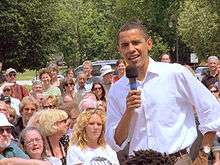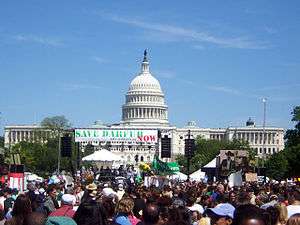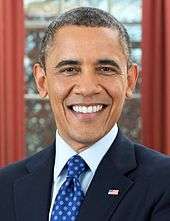Political positions of Barack Obama
Barack Obama has declared his position on many political issues through his public comments and legislative records. The Obama Administration stated that its general agenda was to "revive the economy, provide affordable and accessible health care to all, strengthen our public education and social security systems, define a clear path to energy independence and tackle climate change, end the War in Iraq responsibly and finish our mission in Afghanistan, and work with our allies to prevent Iran from developing a nuclear weapon."[1]
| ||
|---|---|---|
|
Pre-presidency
President of the United States
Policies
Appointments
First term
Second term
Post-presidency
 |
||

Economic policy
President Obama was first inaugurated in January 2009, in the depths of the Great Recession and a severe financial crisis that began in 2007. His presidency continued the banking bailout and auto industry rescue begun by the George W. Bush administration and immediately enacted an $800 billion stimulus program, the American Recovery and Reinvestment Act of 2009 (ARRA), which included a blend of additional spending and tax cuts. By early 2011, the economy began creating jobs consistently each month, a trend which continued through the end of his tenure.[2]
Obama followed with the 2010 Patient Protection and Affordable Care Act. By 2016, the law covered approximately 23 million people with health insurance via a combination of state healthcare exchanges and an extension of Medicaid.[3] It lowered the rate of those without health insurance from approximately 16% in 2010 to 9% by 2015.[4] Throughout his administration, healthcare costs continued moderating; for example, healthcare premiums for those covered by employers rose by 69% between 2000 and 2005, but only by 27% from 2010 to 2015.[5] By 2017, nearly 70% of those on the exchanges could purchase insurance for less than $75 per month after subsidies.[6] The law was evaluated multiple times by the Congressional Budget Office, which scored it as a moderate deficit reducer, as it included tax hikes primarily on high income taxpayers (roughly the Top 5%) and reductions in future Medicare cost increases, offsetting subsidy costs.[7] No House Republicans, and only a few in the Senate, voted for the law.[2]
To address the excesses in the banking sector that precipitated in the 2007-2009 financial crisis, Obama signed into law the 2010 Dodd–Frank Wall Street Reform and Consumer Protection Act, which limited bank risk-taking and overhauled the outdated regulatory regime ineffective in monitoring the non-depository or shadow banking sector at the core of the crisis, which had outgrown the traditional depository banking sector. The Act also created the Consumer Financial Protection Bureau, but did not breakup the largest banks (which had grown even larger due to forced mergers during the crisis) nor separate investment and depository banking, as the Glass-Steagal Act had done. Only a few Republicans voted for the law.[2]
Next came the federal budget debates. The Great Recession had caused federal government revenues to fall to their lowest level relative to the economy's size in 50 years. At the same time, safety net expenditures (including automatic stabilizers such as unemployment compensation and disability payments) and stimulus measures caused expenditures to rise considerably. This drove the budget deficit up, creating significant debt concerns. This caused several bruising debates with the Republican Congress. President Obama signed the American Taxpayer Relief Act of 2012, which included the expiration of the Bush tax cuts for high income earners and implemented a sequester (cap) on spending for the military and other discretionary categories of spending. Compared against a baseline where the Bush tax cuts were allowed to expire on schedule in 2010 for all income levels, this law significantly increased future deficits. Compared against the previously years, it reduced the deficit and limited future cost increases. Along with the recovering economy, the law even lowered the deficit back to the historical average relative to GDP by 2014.[2]
With the economy recovering and major budget legislation behind him, President Obama began shifting to another priority: income and wealth inequality. From 1950 to 1979, the Top 1% earned roughly a 10% share of the income. However, this had risen to 24% by 2007, due to a combination of globalization, automation, and policy changes that had weakened workers' bargaining position in relation to capital (owners).[8] He referred to the widening income gap as the "defining challenge of our time" during 2013.[9] His tax increases on higher-income taxpayers lowered the share of after-tax income received by the Top 1% from 17% in 2007 to 12% by 2015,[8] while job creation remained robust.
Wealth inequality had also risen similarly, with the share of wealth owned by the Top 1% rising from 24% in 1979 to 36% by 2007.[8] While U.S. household net worth rose to nearly 30% from its pre-crisis peak from 2007 to 2016, much of this gain went to the wealthiest Americans, as it had before Obama became President. By 2015, the wealth share owned by the Top 1% reached 42%.[10]
President Obama also tried addressing inequality before taxes (i.e., market income), with infrastructure investment to create middle-class jobs and a federally-mandated increase in the minimum wage. However, the Republican Congress defeated these initiatives, but many states actually did increase their minimum wages, due in part to his support.[2]
Energy policy
President Obama's energy policy can be understood by looking at the different investments in clean energy that was evident in the American Recovery and Reinvestment Act of 2009.
At Andrews Air Force base on March 31, 2010, President Obama announced a "Comprehensive Plan for Energy Security", stating that "moving towards clean energy is about our security. It's also about our economy. And it's about the future of our planet."[11] His plan included raising fuel efficiency standards. He also announced a decision to double the number of hybrid vehicles in the federal government's fleet and one to expand domestic offshore oil and gas exploration in Alaska, the eastern Gulf of Mexico, and off the east coast of the United States.[12]
Federal emergency management / Disaster relief
Obama proposed cuts of $1 billion, or 3%, to the Federal Emergency Management Agency (FEMA) for 2013. More money would be given to state and local programs under Obama's proposal.[13]
Foreign policy

Obama's overall foreign policy philosophy has been postulated as the "Obama Doctrine" by Washington Post columnist E. J. Dionne, which the columnist describes as "a form of realism unafraid to deploy American power but mindful that its use must be tempered by practical limits and a dose of self-awareness."[15] An op-ed article in The New York Times by David Brooks identified Obama as a person having enormous respect for and being deeply influenced by the philosophy of Reinhold Niebuhr.[16]
Overview
Obama's first major speech on foreign policy was delivered to the Chicago Council on Global Affairs on April 23, 2007. He identified the problems that he believes the current foreign policy has caused, and the five ways the United States can lead again, focused on "common security", "common humanity", and remaining "a beacon of freedom and justice for the world":[17]
- "Bringing a responsible end" to the war in Iraq and refocusing on the broader region.
- "Building the first truly 21st century military and showing wisdom in how we deploy it."
- "Marshalling a global effort" to secure, destroy, and stop the spread of weapons of mass destruction.
- "Rebuild and construct the alliances and partnerships necessary to meet common challenges and confront common threats," including global warming.
- "Invest in our common humanity" through foreign aid and supporting the "pillars of a sustainable democracy – a strong legislature, an independent judiciary, the rule of law, a vibrant civil society, a free press, and an honest police force."
During that speech, Obama called for an expansion of the U.S. Armed Forces "by adding 65,000 soldiers to the Army and 27,000 Marines", an idea previously introduced by Defense Secretary Robert Gates.
In a Washington, D.C., speech entitled "A New Strategy for a New World"[18] delivered July 15, 2008, Obama stated five main foreign policy goals:
- Ending the war in Iraq responsibly.
- Finishing the fight against al Qaeda and the Taliban.
- Securing all nuclear weapons and materials from terrorists and rogue states.
- Achieving true energy security.
- Rebuilding US alliances to meet the challenges of the 21st century.
Law enforcement and security policy
United States electronic surveillance has reached an all-time high under Obama, with increased monitoring of emails, text messages and phone conversations.[19]
Social policy
The Almanac of American Politics (2008) rated Obama's overall social policies in 2006 as more conservative than 21% of the U.S. Senate, and more liberal than 77% of the Senate (18% and 77%, respectively, in 2005).[20]
In 2010, Obama signed the Don't Ask, Don't Tell Repeal Act of 2010, which ended a policy of not allowing gays, lesbians and bisexuals to state their sexual orientation openly in the military. In May 2012, he became the first sitting U.S. president to announce his support for legalizing same-sex marriage.[21]
During his second inaugural address on January 21, 2013, Obama called for full equality for people who are LGBT: "Our journey is not complete until our gay brothers and sisters are treated like anyone else under the law — for if we are truly created equal, then surely the love we commit to one another must be equal as well." This was a historic moment, being the first time that a president mentioned gay rights or the word gay in an inaugural address.[22][23]
See also
- Comparison of United States presidential candidates, 2008
- List of Barack Obama presidential campaign endorsements, 2008
- List of Barack Obama presidential campaign endorsements, 2012
- Political positions of Joe Biden
- Political positions of Mitt Romney
References
- "Archived copy". Archived from the original on March 5, 2011. Retrieved March 17, 2009.CS1 maint: archived copy as title (link)
- "In Defense of Obama". Rolling Stone. Retrieved November 19, 2016.
- "Federal Subsidies for Health Insurance coverage". CBO. Retrieved November 19, 2016.
- "Health Insurance Coverage-2015 National Health Interview Survey". CDC. Retrieved November 19, 2016.
- "Employer Health Benefits 2015". Kaiser Family Foundation. Retrieved November 19, 2016.
- "Rates Up 22 Percent For Obamacare Plans, But Subsidies Rise, Too". Retrieved November 19, 2016.
- "Budgetary and Economic Effects of Repealing the Affordable Care Act". Retrieved November 19, 2016.
- "Striking it Richer" (PDF). Emmanuel Saez Berkeley. Retrieved November 19, 2016.
- Obama says income inequality is defining challenge for U.S. PBS NewsHour. December 4, 2013. Retrieved December 26, 2013.
- "FRED Households and non profit organizations net worth". Retrieved November 19, 2016.
- "Remarks by The President on Energy Security at Andrews Air Force Base, 3/31/2010". whitehouse.gov. March 31, 2010. Retrieved November 9, 2016.
- By the CNN Wire Staff (March 31, 2010). "Obama energy plan would open Atlantic and Gulf drilling". CNN.com. Retrieved November 9, 2016.
- Sonmez, Felicia (October 30, 2012). "Romney ignores questions about eliminating FEMA". The Washington Post.
- Hunt, Kasie (May 1, 2006). "Celebrities, Activists Rally Against Darfur Genocide". USA Today. Retrieved January 14, 2008. For excerpts from Obama's speech, see: "More Must Be Done in Darfur". The Hill. April 30, 2006. Archived from the original on February 5, 2008. Retrieved January 14, 2008.
- "E.J. Dionne Jr. - The Obama Doctrine in Action". Washingtonpost.com. Retrieved November 9, 2016.
- "Obama, Gospel and Verse". David Brooks. The New York Times. April 26, 2007. Retrieved March 19, 2010.
- "Foreign Policy Remarks at CCGA". my.barackobama.com. Retrieved November 9, 2016.
- Obama, Barack (July 15, 2008). "A New Strategy for a New World". Obama for America. Retrieved July 16, 2008.
- John Pike (September 29, 2012). "Report: Surge in U.S. Gov't Electronic Surveillance". Globalsecurity.org. Retrieved November 9, 2016.
- Michael Barone with Richard Cohen. Almanac of American Politics (2008). National Journal. p. 538.
- "Obama says same-sex couples should be able to marry". BBC.co.uk. May 9, 2012.
- Robillard, Kevin (January 21, 2013). "First inaugural use of the word 'gay'". Politico. Retrieved January 21, 2013.
- Michelson, Noah (January 21, 2013). "Obama Inauguration Speech Makes History With Mention Of Gay Rights Struggle, Stonewall Uprising". Huffington Post. Retrieved January 21, 2013.
External links
Topic pages and databases
General
- Chicago Tribune – Candidate coverage
- On the Issues – Issue positions
- Project Vote Smart – Candidate information, including issue positions
Disability issues
Environment
- Obama & environmental issues: Comprehensive review from the League of Conservation Voters.
Foreign affairs
- "Renewing American Leadership" – detailed article by Barack Obama in Foreign Affairs
- Barack Obama's positions on top foreign policy issues – extensive material documented by the Council on Foreign Relations
Health care
- 2008 Presidential Candidate Health Plan Report Card issued by the National Physicians Alliance
- 2008 Presidential Candidates' Health Reform Proposals from The Commonwealth Fund
Israel and the Middle East conflict
- Obama on Zionism and Hamas – extensive interview with Jeffrey Goldberg
- Speech by Senator Barack Obama
- McCain, Obama positions on Mideast issues Associated Press June 6, 2008
